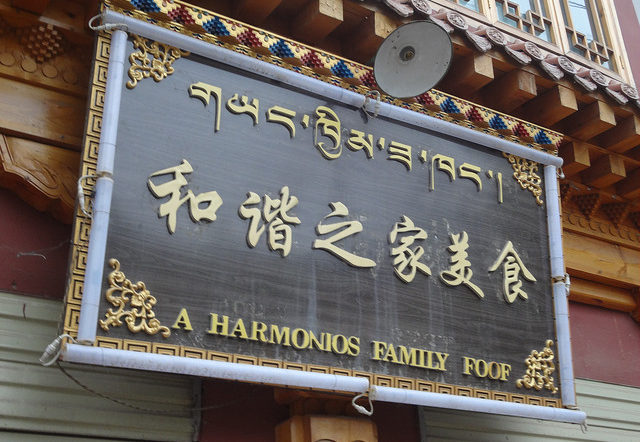"A Harmonios Family Foof"
« previous post | next post »
Sign on a Sino-Tibetan restaurant:

(Source)
Tibetan
g.yang khyim za khang
གཡང་ཁྱིམ་ཟ་ཁང་།
"Prosperous Home Restaurant"
Notes:
za khang ([eat-house] "restaurant")
Robbie Barnett: Well, it's ok. But I think the word order is wrong: it is adj-noun, should be noun-adj. But I think this is allowable in some cases?
Janet Gyatso: It’s an odd term, g.yang khyim, but it works.
Nathan Hill: It could be worse. One does not usually think of families as being auspicious or unauspicious, and the syntax is a bit weird with the modifier preceding the head, but this is not at all unprecedented.
Douglas Duckworth: The Tibetan is a bit unusual. g.yang means more "prosperity" or something like "mojo" – an unusual adjective for a family (khyim) restaurant (za khan). I suppose it is OK; it is perhaps a creative use of pairing terms for marketing purposes.
Matthew Kapstein: the "Prosperous Household Restaurant"
I'm sure the foof is just great….
Chinese
héxié zhī jiā měishí
和谐之家美食
"Harmonious Home / House / Family Cuisine / Fine Food"
Notes:
Despite its deceptively simple and benign appearance, the word "héxié 和谐 ("harmony; harmonious") is a highly sensitive term in contemporary Chinese society. This is because, after President Hu Jintao introduced the concept of a héxié shèhuì 和谐社会 ("Harmonious Society") as a political program in 2005, it was imposed upon the populace in such a draconian fashion that all sorts of repressive acts were carried out in the name of harmony. This led to the use of héxié 和谐 as an adversative passive verb (e.g., "was harmonized"), which was not a good thing. When héxié 和谐 became stigmatized, the censors would block the term, whereupon netizens punningly referred to it with the homophonous héxiè 河蟹 ("river crab"). See:
- "Peace and Harmony " (10/16/15)
- "High-speed railroaded" (2/12/11)
- "Word of the Week: River Crab" (3/21/12)
The Tibetan for "harmonious society" would be 'cham mthun spyi tshogs འཆམ་མཐུན་སྤྱི་ཚོགས་ .
English
A Harmonios Family Foof
That's Chinglish for "Harmonious Family Food".
Notes:
Bon mot from Jichang Lulu: 'FOOF' is very good. It's to ‘food-under-a-roof' ('eat-house') what túshūguǎn 圕 ('library') is to túshūguǎn 图书馆 ('library').
See:
- "Polysyllabic characters in Chinese writing " (8/2/11)
For "foof", for some reason I can't keep from thinking of "food on the hoof".
[Thanks to Leonard van der Kuijp]
Mara K said,
September 3, 2017 @ 11:17 pm
I came to this post through Twitter, which wanted to translate "foof" from Haitian Creole.
Ken said,
September 4, 2017 @ 9:02 am
Not this FOOF, I hope.
Robert said,
September 4, 2017 @ 2:09 pm
Foof is one of many British euphemisms for the female pudendum. It is the type of word one teaches children to use so that they can practice holding back taboo vocabulary without any bad consequences if they fail to do so in public.
Here is an example of the term foof being used in context:
https://www.mumsnet.com/Talk/mumsnet_classics/2934136-My-foof-is-buzzing
Joe Fineman said,
September 4, 2017 @ 7:09 pm
Harmonized = gleichgeschaltet?
ajay said,
September 5, 2017 @ 3:37 am
It's also FOOF, dioxygen difluoride, subject of one of Derek Lowe's terrific "Things I Won't Work With" posts.
http://blogs.sciencemag.org/pipeline/archives/2010/02/23/things_i_wont_work_with_dioxygen_difluoride
Jichang Lulu said,
September 7, 2017 @ 12:20 pm
གཡང་ g.yang 'prosperity' is discussed in a recent post on Tibeto-logic, Dan Martin's blog. He also refers to this post in the comments; he doesn't see any problem with the expression g.yang khyim in the restaurant sign.
I think Laurent Sagart has proposed 祥 xiáng 'auspicious' as a possible cognate of g.yang.
Scott P. said,
September 7, 2017 @ 12:26 pm
So to my ears 'foof' is an inherently funny-sounding "word". I am chuckling right now. Foof!
Are there other such sounds that sound funny in other languages? What would a Mandarin equivalent for "foof" be?
amy said,
September 9, 2017 @ 11:27 am
Using "river crab" would've been far more appropriate for a restaurant!